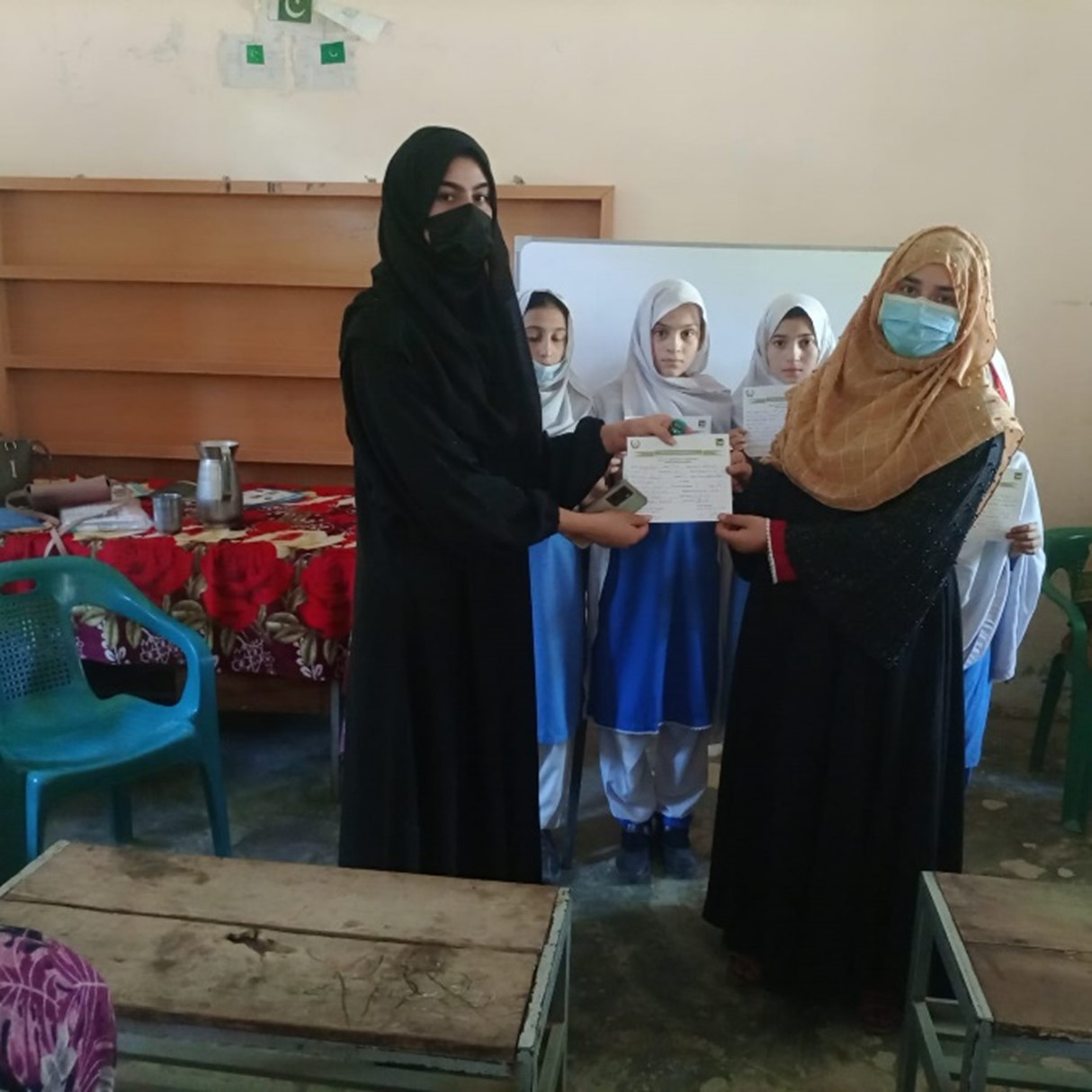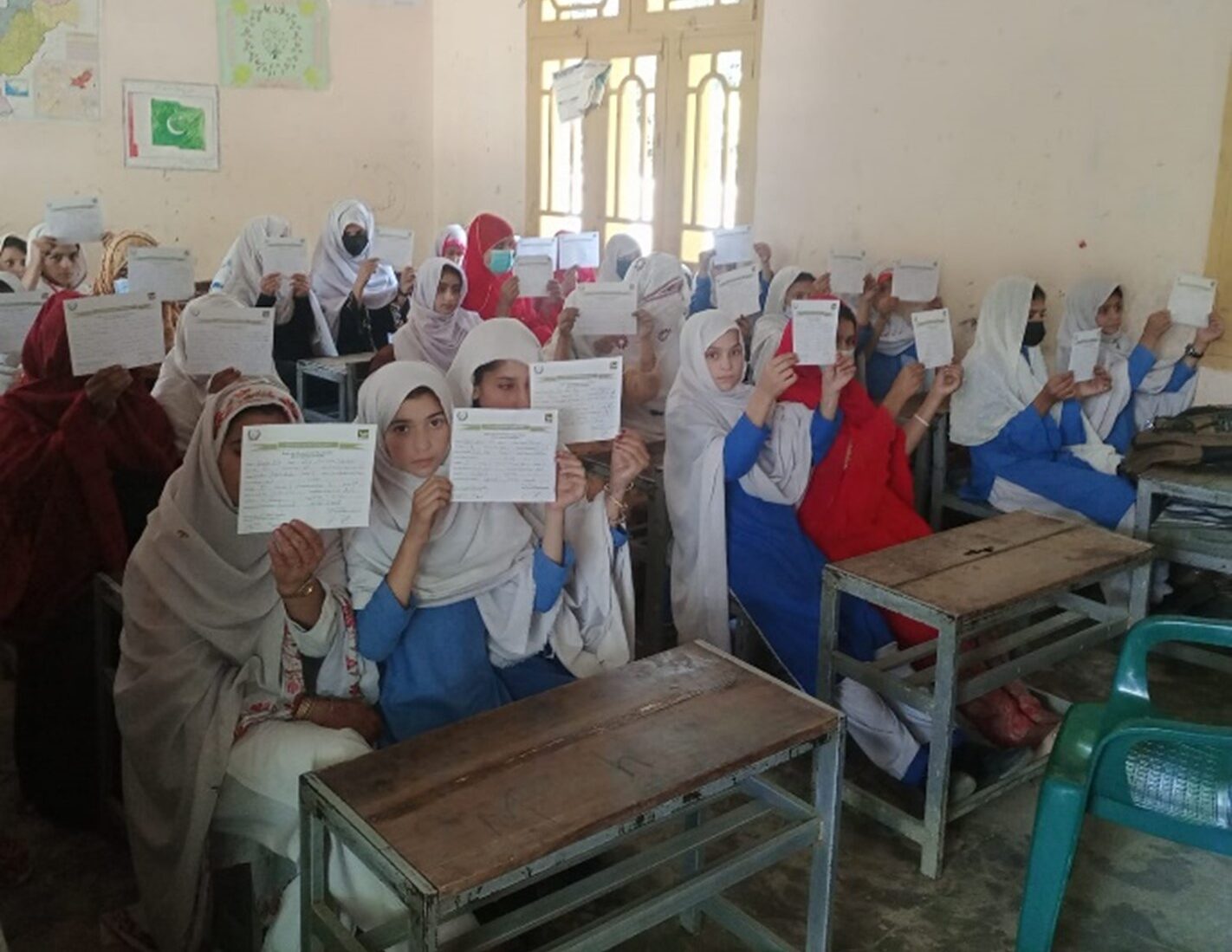Success Story
Accelerated Learning Program Centers Creating a Brighter Future for Girls in Khyber Pakhtunkhwa, Pakistan
July 9, 2024
In the remote Upper Dir district in Khyber Pakhtunkhwa (KP) province in Pakistan, girls’ education often seems unattainable due to cultural norms, financial constraints, and lack of school facilities and female teachers. This leads to a significant number of children, especially girls, dropping out of primary or elementary school. With this context in mind, the USAID-funded New Partnerships Initiative EXPAND: New Partners for Better Health (NPI EXPAND) Human Development Activity (HDA) provided hope for both students and females teachers, improving girls’ access to education and the quality of teaching provided.
A Case Study in Improving Teaching
Saba Gul began her journey as a primary-level Accelerated Learning Program (ALP) teacher at the Government Primary School, Hattan Khas, in Upper Dir, KP at the age of 27 with a master’s degree in Islamic studies. Her village is conservative and does not place value on educating girls. Middle and secondary schools for girls are limited with overcrowded classrooms, and religious and cultural norms that hinder educational progress, especially for girls.
Despite these challenges, Saba remained optimistic that things would get better. She was encouraged when she learned about NPI EXPAND HDA, which aimed to support the KP government to integrate girls into the educational system and improve access to health and family planning services. NPI EXPAND HDA awarded grants to local partners to increase out of school children’s access to basic education, especially for adolescent girls, in Upper Dir and Buner districts. The Peace and Development Organization, one of NPI EXPAND HDA’s local partners working in Upper Dir, established 54 ALP centers in the district to provide quality education to out-of-school girls. ALP centers provide non-formal education to children who have never attended or have dropped out of school. Once students reach an academic level commensurate with their age and grade level, NPI EXPAND HDA’s local partners support their integration into the formal school system.
The project operated in three tehsils (sub-districts), Dir, Barawal, and Sheringal, in close collaboration with the district Education Department and other stakeholders to provide elementary and primary-level education to young girls and foster a supportive environment for their academic growth. It also served as a platform for ALP teachers and Parent-Teacher Council members’ professional development, strengthening their capacity to better serve their communities.
Saba applied to and was selected by the Peace and Development Organization to be an ALP teacher. She attended a five-day training program on community mobilization strategies, the academic content of the accelerated learning packages, and alternative strategies for teaching and assessment. “USAID’s NPI EXPAND HDA intervention, in partnership with the government, has been a beacon of hope, opening doors to education and empowerment for girls like never before,” said Saba.

Saba engaged actively with the community to raise awareness about the importance of education, organizing Parent-Teacher Council meetings, workshops, and community events to involve parents in their children’s education. “Being a local teacher made my work easier due to the community’s acceptance,” she explained. Saba fostered a sense of ownership and support within the community and enrolled 35 students in her center, which was based in the Government Girls’ Primary School Hattan Bala, Tehsil Dir, and operated in the afternoons after the end of the regular school day.
Saba incorporated the pedagogy she learned from the teacher training, including interactive methods like storytelling and group activities, to help students learn and think critically. She tailored her approach to each student’s needs, nurturing strengths, addressing weaknesses, and supporting them through co-curricular activities including sports, arts, and cultural events. Her students showed great enthusiasm for all classroom activities. The ALP center also became a social hub for them, where they shared laughter and had fun. These efforts enabled her to retain all her students throughout the academic year without any dropouts.
Her dedication paid off as her students excelled. The impressive results of these students highlighted the impact of the Accelerated Learning Program and 29 students in this project cleared their assessments, with many scorings high grades, demonstrating the ALP’s impact and Saba’s effective teaching. More than 70 percent of students who transitioned to the mainstream school are continuing their education.
Helping Girls Like Nargis Continue Their Education
From the student perspective, the cultural norms in Upper Dir often restrict access to education, in particular for girls. Despite these challenges, Nargis Bibi, a 15-year-old from Seratai village who dropped out after completing primary school, was determined to pursue her education.
Alongside developing ALP centers, the Peace and Development Organization conducted 54 awareness raising sessions, engaged more than 1,000 parents and community leaders, and ran a door-to-door campaign to encourage enrollment. The impact of these efforts rippled through Nargis’s community and eventually reached her family. Her parents were ultimately persuaded to enroll her in the local ALP center, reassured by its safe, culturally appropriate learning environment. “It was a turning point,” said Nargis.

Peace and Development Organization supported the ALP Center at Government Middle School, Sertaj, Upper Dir, where Nargis completed Grade 8. Students pictured here are presenting their course completion certificates.
Nargis’s commitment and hard work led her to emerge as a top-performing student at her ALP center. She participated actively in class discussions and completed the equivalent of grade seven with high results. She said, “I knew education held the key to unlocking a better future.”
The Peace and Development Organization facilitated Nargis’s transition to grade eight in the Government Girls’ Middle School in Seratai village. Her father supports her goal of continuing her education and takes her to and from school on his motorbike before and after work.
Today, Nargis is an inspiration for other girls in her community and her ALP center. All 954 elementary-level students enrolled in ALP centers established through NPI EXPAND HDA have passed their final learning assessments and have received their course completion certificates. These centers continue to transform the lives of hundreds of talented girls like Nargis and offer them an opportunity to pursue higher education in formal schools.
As Nargis looks towards the future, her dreams extend beyond academic pursuits. “I want to be a teacher,” she declares, her eyes sparkling with determination. “I want to provide the same opportunities to others that I received through the ALP.”
The NPI EXPAND HDA project aimed to both improve teaching quality through professional development and increase girls’ access to education in an environment where it may normally be restricted. Stories like Saba’s demonstrate how ALP teachers enhanced their skills to benefit students’ education and make it more accessible for out-of-school children. On the student side, Nargis shows how access to education can unlock young girls’ potential, allowing them to go on and be successful in all their endeavors.